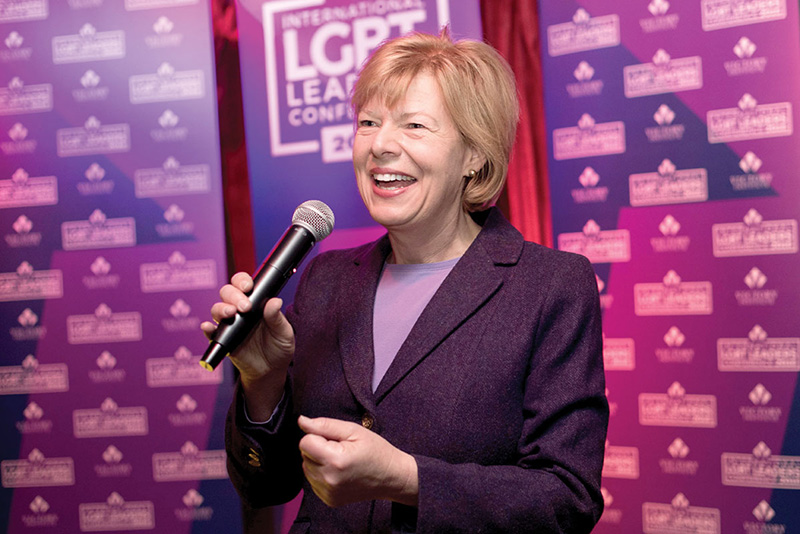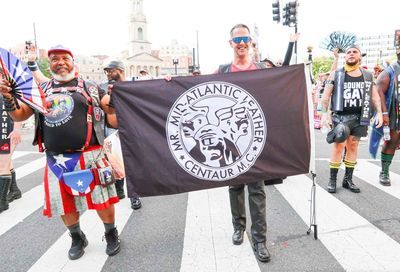Florida Wants to Expand “Don’t Say Gay” Law
Florida Senate President says she believes the law's ban on LGBTQ instruction should be applied to middle school classrooms.

Florida lawmakers are considering expanding provisions of Florida’s “Parental Rights in Education” law, also known as the “Don’t Say Gay” bill, to apply to students in fourth, fifth and sixth grade.
Currently, the law prohibits “instruction” related to sexual orientation or gender identity in grades K-3, and requires that any such “instruction” be “age or developmentally appropriate” for older students.
Proponents of the law say it ensures parents are not kept in the dark about developments or decisions made by administrators in how schools deal with their children. Critics of the law say it encourages teachers to self-censor and to infringe on students’ free speech rights over fears of opening up themselves or their schools to legal action from parents who are empowered to sue if they believe the law has been violated.
Although Florida public schools never had any official curriculum about gender and sexuality in grades K-3, proponents of the law, which was signed by Gov. Ron DeSantis last year, complained that they had seen evidence of LGBTQ-related instruction or promotion seeping into classrooms without giving parents opposed to homosexuality the chance to have their children “opt out” of such discussions.
Proponents also claim that the law simply prevents teachers from broaching LGBTQ-related topics as part of official classroom instruction, but does not prevent students from discussing LGBTQ issues among themselves.
Since the law took effect last year, LGBTQ topics have largely been banned from classroom discussion in grades K-3, and the Florida Department of Education has been developing guidance on how teachers can comply with the law and determine whether LGBTQ-related material is “age or developmentally appropriate.”
But according to the Daily Mail, a staffer for Florida Senate President Kathleen Passidomo (R-Naples) informed the British newspaper that the legislature is seeking to expand the ban on “instruction” to include fourth, fifth, and sixth graders — the grades when students typically begin studying health and sex education curriculum, albeit an abbreviated study of such issues.
Last month, in response to a reporter’s question about efforts to expand the law, Passidomo said she is looking at raising the upper grade limit, but wouldn’t go so far as extending the ban on instruction to the high school level.
“The one thing that I think could be looked at is, you know, we ended it at grades one through three,” Passidomo said. “I don’t think I’d be supportive of high school because kids in high school are, hopefully, a little more mature, or at least they should be. But, you know, the middle school, maybe go up to 6th grade or something like that.”
The Florida Department of Education has not commented on whether it supports expanding the law to apply until the sixth grade.
Bryan Griffin, the press secretary for DeSantis, said that the governor “would certainly consider the merits of such a bill in final form if it comes to his desk as a product of the forthcoming legislation session.”
DeSantis has previously railed against what he sees as an attempt to “indoctrinate” students by exposing them to concepts or ideas like gender identity, critical race theory, or other “woke” points of view. In his inauguration speech last week, he vowed to ensure that Florida would remain a “family-friendly” state by cracking down on people or entities who would “rob [children] of their innocence.”
The governor has also demanded that universities in the state detail how much they spend on classes and programs related to diversity, equity, inclusion, and critical race theory, and who is overseeing such programs or classes. He recently appointed a prominent right-wing, anti-LGBTQ activist who has talked about the need to “reconquer public institutions” from left-wing ideology to the board of a progressive-leaning college as part of an attempt to raze and overhaul the school’s current curriculum.
Since the law has taken effect, some critics say censorship in classrooms has persisted. One parent, Norma Schwartz, who is the vice president of education for the Miami-Dade County Council of PTAs and PTSAs, told the New York Post that her eighth-grade daughter reported that teachers have taken down posters or stickers that indicate LGBTQ-friendliness out of fear of violating the law.
Although the law is vague about what it specifically prohibits — as well as what constitutes “instruction” — because parents are empowered to sue school districts under the law, it is likely that school districts will find themselves on the receiving end of such lawsuits alleging violations of “parental rights” for years to come.
As a result, Andrew Spar, the president of the Florida Education Association, says that school districts are now allocating more money to their litigation budgets as they wait for “an inevitable flood of legal challenges” set to befall them.
Support Metro Weekly’s Journalism
These are challenging times for news organizations. And yet it’s crucial we stay active and provide vital resources and information to both our local readers and the world. So won’t you please take a moment and consider supporting Metro Weekly with a membership? For as little as $5 a month, you can help ensure Metro Weekly magazine and MetroWeekly.com remain free, viable resources as we provide the best, most diverse, culturally-resonant LGBTQ coverage in both the D.C. region and around the world. Memberships come with exclusive perks and discounts, your own personal digital delivery of each week’s magazine (and an archive), access to our Member's Lounge when it launches this fall, and exclusive members-only items like Metro Weekly Membership Mugs and Tote Bags! Check out all our membership levels here and please join us today!

































You must be logged in to post a comment.